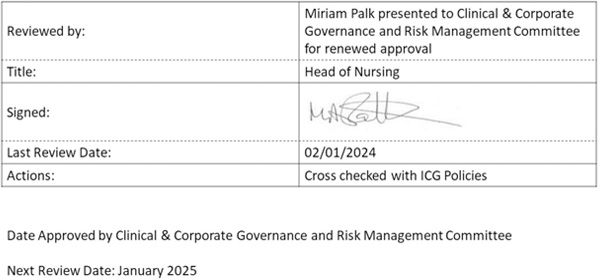Version Control Sheet
VERSION: 1
DATE OF IMPLEMENTATION/REVIEW: 02/01/2024
IMPLEMENTED AND AUDITED BY: Tamanash Chatterjee
STATUS: Approved
COMMENTS: To be reviewed 02/01/2025
Purpose
This policy sets out the position of the Company on the question of whistleblowing and provides detailed advice.
Statement
As an organisation where the highest standards of integrity and trust are expected by our Clients the Company is committed to maintain exemplary levels of honesty, openness and transparency in all its dealings and actions. Therefore, the Company treats unprofessional conduct very seriously, whether it is committed by managers, employees, suppliers or contractors.
It is recognised that an employee may find it difficult to raise concerns of malpractice or misconduct. This policy will provide a means to raise any concerns so that they can be investigated properly, sensitively and in confidence. The Company also recognises the need to ensure any employee using this system is protected from receiving or suffering any disadvantage as a result of raising a concern in good faith.
Procedure and Guidance
Whistleblowing is a term used when someone who works in or for an organisation raises a concern about a possible fraud, crime, danger or other serious risk that could threaten customers, colleagues, shareholders, the public or the organisation’s own reputation.
If any employee brings information about a wrongdoing to the attention of their employers or a relevant organisation, they are protected in certain ways under the Public Interest Disclosure Act 1998, so people are encouraged to speak out if they find malpractice in an organisation.
Public Interest Disclosure
“Blowing the whistle” is more formally known as 'making a disclosure in the public interest.' Disclosure of information is information, which, in the reasonable belief of the employee making the disclosure, tends to show one or more of the following:
Any employee who has a concern regarding malpractice and misconduct within the Company, related to the above should raise that concern internally, rather than externally, wherever possible. The employee is free to choose to whom the matter is to be disclosed but it is recommended that he/she reports the matter to his/her immediate supervisor in the first instance.
Should the report concern the supervisor then the matter can be disclosed to any member of the senior management. This policy is not intended however to replace the Company’s Grievance Procedure that remains the proper method of dealing with issues of a personal nature relating to matters of employment.
Matters can be raised either verbally or in writing.
Upon receipt of a disclosure made under this policy, the supervisor, manager or director will confirm to the employee what steps will be taken to investigate the matter, the likely timeframe and how the outcome may be communicated. The manner in which such an investigation takes place, and the precise steps which may be necessary to reach a conclusion will usually reflect the seriousness and/or complexity of the allegations in the disclosure.
On occasion, and at its discretion, the Company may identify a third party to investigate the matter and report its findings.
It is both a fundamental principle and a legal requirement that employees will not be punished or subject to detrimental action as a result of making a disclosure in accordance with this policy. Any harassment, victimisation or less favourable treatment of any persons will be treated as a disciplinary offence.
Should any employee make a disingenuous disclosure i.e., in order to cause disruption to the Company or without reasonable belief, or accuracy, disciplinary action may be taken against such an individual.
Use of this policy will not affect any duty of confidentiality an employee may owe the Company. Under the duty of confidentiality employees may not disclose confidential information about the Company without authorisation.
In all cases employees are encouraged to exhaust the Company’s internal procedures before considering the possible contact of external sources.
KLOE Reference for this Policy: Safe | Well-Led
Regulations directly linked to this Policy: Regulation 12: Safe care and treatment | Regulation 20: Duty of candour
Regulation(s) relevant to this Policy:
Next Review
